The Georgia Effect: Why Everyone’s Looking Up at the Dawgs

The last team to be flattened by the Georgia juggernaut was TCU. The 65–7 score was the most lopsided not only in the nine-year history of the College Football Playoff, but also in the lengthier annals of major postseason college football games. Now that the bruises from that bludgeoning have sufficiently healed, Horned Frogs coach Sonny Dykes can offer a frank appraisal of what it was like to play the Bulldogs.
“Comparing them to other people we played last year, there was a difference,” Dykes says.
“Typically you look at teams and you go, ‘Well, they’re really good here but not as good there.’ Them, across the board, they were good. So much of football, and sports in general, is creating a favorable matchup. You look at Georgia and you go, ‘Where are the matchups?’”
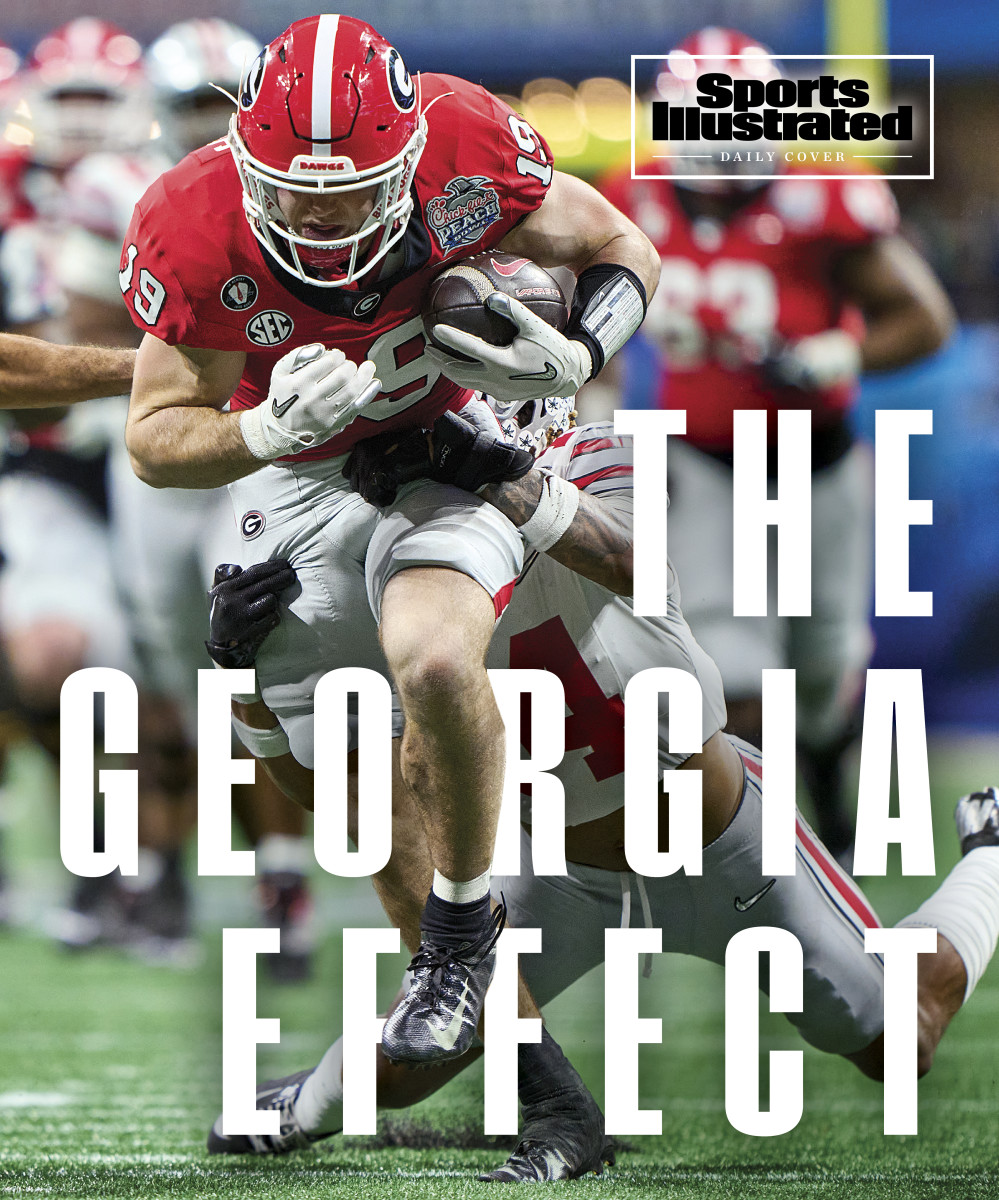
If they exist in 2023, they aren’t obvious—even with the Dawgs losing their 25-year-old starting quarterback, even after having a record 25 players selected in the past two NFL drafts, even after their offensive coordinator left for the pros. Georgia’s stockpiling of talent is that impressive, the coaching is that good and the overall university commitment to winning is that complete. (Disturbingly complete, it could be argued, but more on that later.)
Kirby Smart has ripped the ruling scepter of college football from the hands of his former boss, Alabama coach Nick Saban. Smart’s program has won 17 consecutive games and 33 of its last 34, with 28 of those victories by double digits. Georgia has opened up daylight on the rest of the nation—how much daylight is debatable, but it’s there.
Now, blessed with a soft schedule, Georgia is primed for a run at history this fall. The 2021 and ’22 national champions will start ’23 as Sports Illustrated’s No. 1 team, and most everyone else’s, too.
Stunningly, given all the talk over the years about alleged dynasties in the sport, college football has never had a three-peat at the highest level. Could Georgia break through that historical barrier?
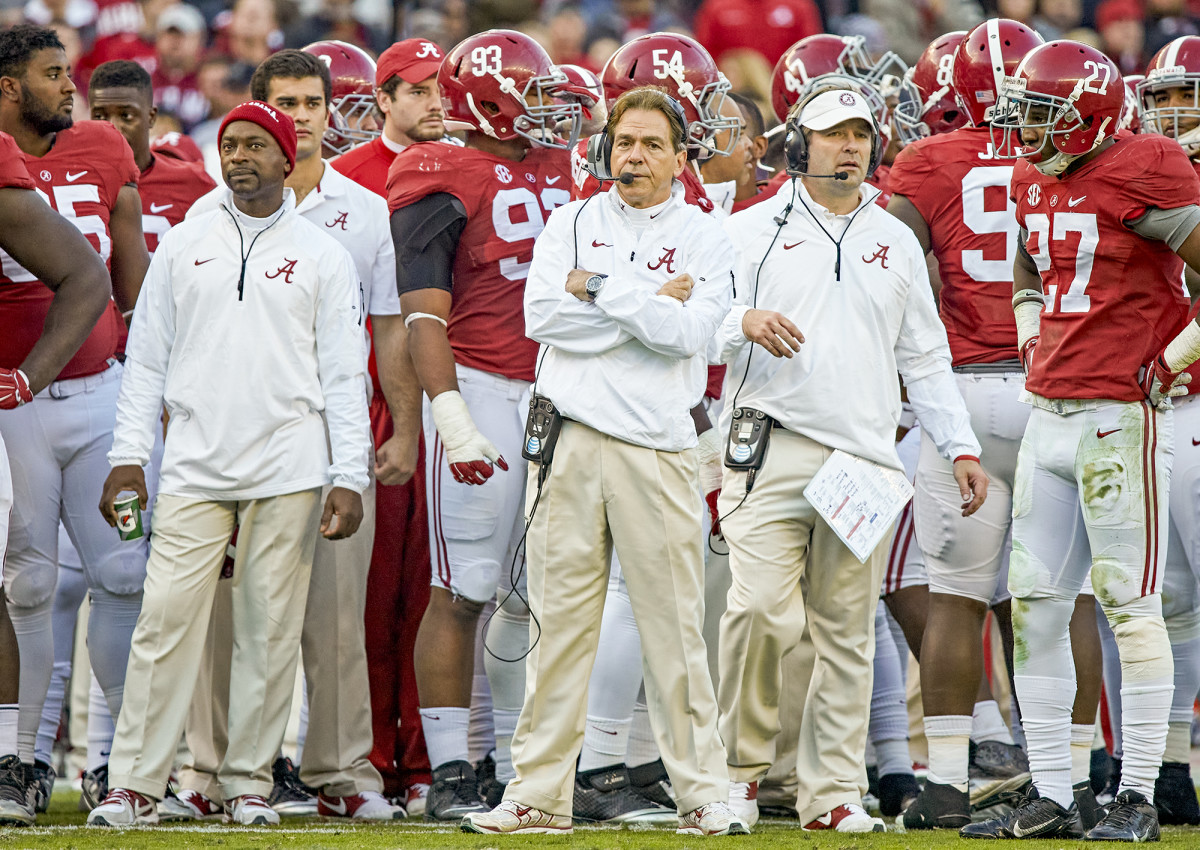
“I do think it’s going to be much tougher,” Smart said in January, after the repeat. “And I do think we’re going to have to reinvent ourselves because you can’t just stay the same. It’s easy to get comfortable. And comfortable does not win.”
That’s the Saban in Smart, forever fearful of complacency. Between an insatiable drive to win, his strategic defensive acumen and a nonstop recruiting motor, Smart is the next Saban—five titles behind right now, but on an accelerated timetable. Consider: Smart won two titles by age 47; Saban didn’t capture his first until he was 51. Smart won his first natty in his sixth season as a head coach; Saban was in his 10th. Provided Smart doesn’t burn out or repeat Saban’s NFL dalliance, there’s no telling how far the Georgia coach can take his once-underachieving alma mater.
“What they’re doing in Athens, Georgia, right now is on a whole ’nother level,” Houston coach Dana Holgorsen said. “I’ve been to a lot of NFL camps. I’ve been to Alabama. I’ve been to a lot of places. Just the commitment from the athletic department, to the funding, to how they’re feeding them, to how they’re practicing, how they’re lifting, what their staff looks like. It’s big time. And clearly it works because they’re back-to-back national champs.”
Thus it’s fair to wonder whether the Georgiafication of college football is at hand, as the school follows its blueprint to domination. The Dawgs’ recent dominance is built upon five pillars, all of which were keys to the Alabamafication of the sport between 2009 and ’20:
Recruiting
College football doesn’t have a parity-inducing draft like the NFL’s, so programs have the ability to stack up top-ranked recruiting classes that can create extended periods of prosperity. And when your players are better than everyone else’s, you don’t always have to have your A game to win.
“When they didn’t play well last year—against Missouri, probably didn’t play that well against Ohio State [in the CFP semifinals]—their talent allowed them to overcome not having their best performance,” Dykes says.
Smart’s first signing class at Georgia was ranked ninth nationally by the recruiting website Rivals.com. Since then, all seven of his classes have been ranked in the top five, six of those in the top three, and three of them were No. 1 in the nation. The class of 2024 is still a work in progress, but as of mid-July, Georgia was again ranked first.
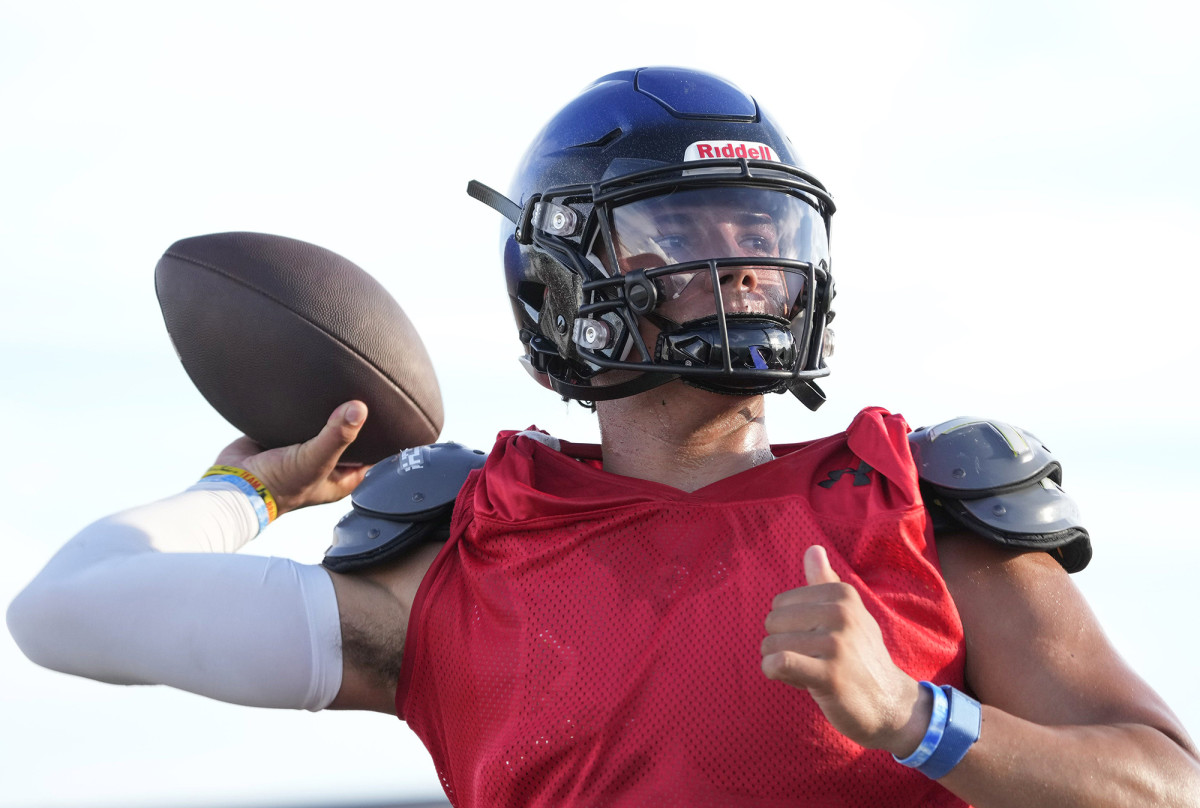
Smart has extended his recruiting reach far outside the SEC footprint. The best player on this year’s team, tight end Brock Bowers, hails from Napa, Calif. The defensive Most Outstanding Player of the title-game victory over Alabama two seasons ago was cornerback Kelee Ringo, who went to high school in Scottsdale, Ariz. Georgia landed a commitment in May from the No. 1 player in the class of 2024, quarterback Dylan Raiola, who was going to high school in Phoenix at the time (he’s since moved to Buford, Ga.). If the current commitments hold, Raiola’s freshman classmates in Athens will include players from New York, New Jersey, Connecticut, Illinois, California and Iowa.
But prosperity starts at home, and Smart is crushing it there as well. The 2024 crop of Peach State prospects is considered among the best ever, with 49 players rated as four- or five-star prospects. Eight of them had already committed to the Bulldogs, with more assuredly on the way as the December and February signing periods get closer.
“We’ll always recruit the nation to find guys like Brock,” Smart said. “But we’ll always recruit our home base because it just means so much in our state.”
Not all the home-state Dawgs arrived on campus with flashy credentials, though. Stetson Bennett of Blackshear was, famously, a walk-on who left for junior college before transferring back and led the team to two titles. And one of the heroes of last year’s Playoff run, defensive back Javon Bullard of Milledgeville, was a three-star prospect. They both had the intangible Smart tells his assistants to find on the recruiting trail: “Sign the ones who can’t stand losing.”
Defense
This is an offense-first era, but most national championship teams know how to get stops as well. Georgia, like Alabama before it, has been consistently great on that side of the ball.
Last season the Bulldogs were fifth nationally in scoring defense and 10th in yards allowed per game—actually below the recent program standard, with a young unit replacing a horde of high draft picks. The year before, Georgia was first in scoring defense, second in total defense and second in yards allowed per play. Five of Saban’s six national championship teams at Alabama ranked first, second or third nationally in scoring defense and total defense.
Smart, with the help of top defensive assistants Glenn Schumann and Will Muschamp, has gameplanned ways to frustrate spread offenses without an overreliance on gimmicks. The Dawgs have figured out ways to get more speed on the field while still using hefty, blocker-swallowing linemen. In general terms on defense, their big men run unusually fast, and their small men hit unusually hard.
This year eight defensive starters and eight of the team’s top 11 tacklers from 2022 are back, giving Smart greater experience than last year to go along with the usual freakish athleticism. In addition, 10 freshman defensive players enrolled early in an effort to ramp up preparedness to contribute this fall. That includes all three Rivals five-star signees: outside linebackers Damon Wilson and Samuel M’Pemba, and defensive tackle Jordan Hall.
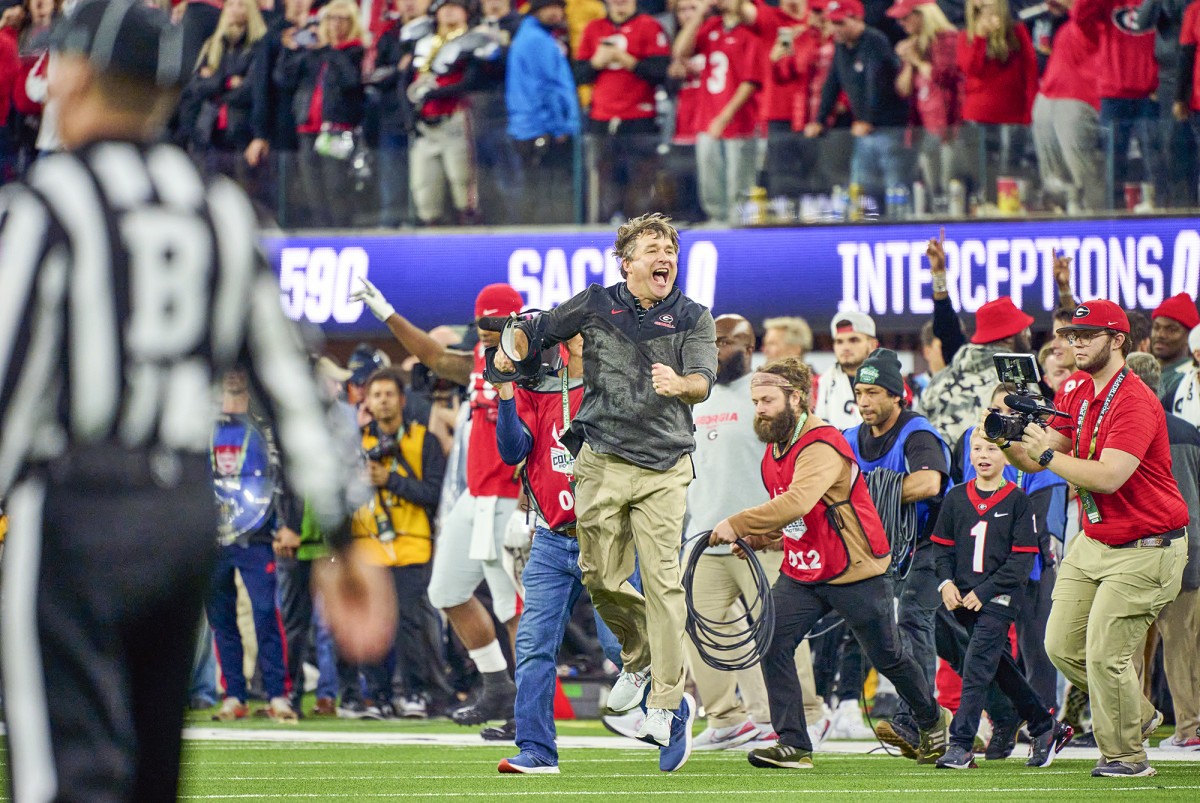
Physical Dominance
For all the complex scheming of modern football, the ability to pound the opposition into submission remains the straightest path to victory. Being large and mean matters, and Georgia is the national leader in strongman brutality.
“If [players] don’t like contact, Georgia’s not the place for them,” Muschamp says. “I can tell you that.”
The Bulldogs physically punked Michigan in a 34–11 thumping in the 2021 CFP semifinals. They similarly bullied Tennessee and TCU last season. It’s a contact sport, and they relish the contact.
“Don’t ever underestimate the power of physical toughness,” Smart shouted to his team in the locker room after beating No. 6 Tennessee 27–13 last November. “Physical toughness wins in football now. And if you in this room? You got it. And if you coming here? You better believe in it.”
In the past two seasons no opponent has gotten the better of Georgia at the line of scrimmage. The 2022 Bulldogs both ran (5.53 yards per carry, fifth nationally) and stopped the run (2.88 yards per carry allowed, third nationally) with authority. In ’21, the gap between Georgia’s average run (5.26) and its average allowed (2.56) was even greater.
Quarterback Play
Bennett’s metamorphosis from presumed liability to major advantage elevated Georgia from good to great in the past two seasons. His intelligence helped embolden former coordinator Todd Monken, who left in February after three years to become the Baltimore Ravens’ offensive coordinator, to open up the offense last season. Bennett threw 10 more passes per game in 2022 than in ’21, and the Dawgs were considerably more creative with play calls and formations.
Bennett’s mobility helped, too. He rushed for 464 yards the past two seasons and 10 touchdowns last year, and was third in the nation both seasons in total offense yards per play (8.48 in ’22, 9.10 in ’21). And he was great in the clutch, leading fourth-quarter comebacks against Alabama and Ohio State in Playoff games.
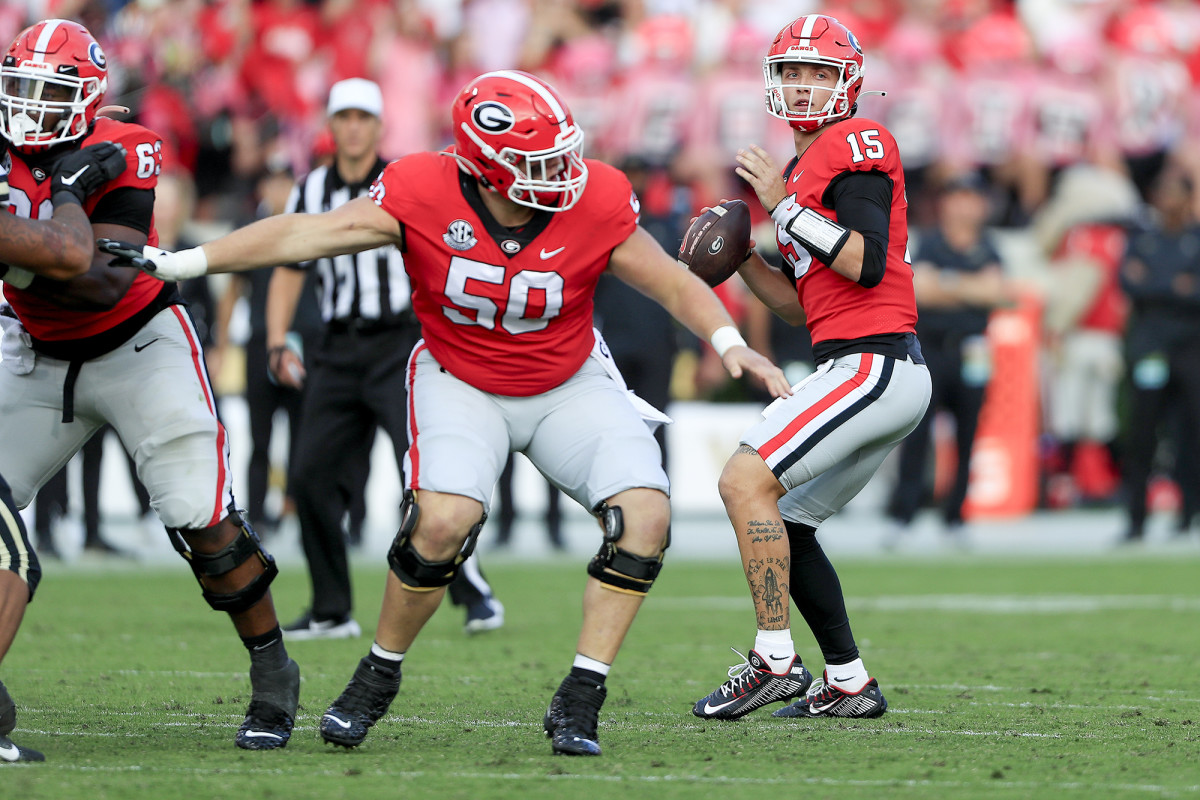
Replacing Monken and Bennett are the biggest challenges for Georgia this year. Mike Bobo, who was an offensive analyst with the team in 2022, is back in the coordinator role after mixed reviews of his work under Mark Richt from ’07 to ’14. Carson Beck, a junior, emerged from spring practice as the starting QB, but Georgia has other options if he struggles. In any case it seems likely the quarterback will be asked to do less this season, given the wealth of other strengths.
When Raiola, with his first-round NFL talent, comes aboard next season, he’ll have the chance to give Georgia its highest level of quarterback play in the Smart era. If every other aspect of the team remains rock solid, he could make the Bulldogs even better.
Alignment
This has been a coaching buzzword in recent years. Loosely translated, it means the head coach can get whatever he thinks he needs from university administration (and, increasingly, boosters) to win big. After a long period of time when that was not the case, Georgia now has it in spades.
Whatever Smart has wanted in terms of facilities, staffing and recruiting budget, he’s gotten from school president Jere Morehead and athletic director Josh Brooks (and before him, Greg McGarity). The palatial Butts-Mehre Heritage Hall training facility opened in 2017, and an expansion was completed last year; Georgia lists 55 football staffers on its website; and the recruiting budget ($4.5 million in ’22) is reportedly the biggest in the nation. The name, image and likeness machinery is now running smoothly as well. Don’t expect the Dawgs to lose many top recruits due to being outbid by their rivals.
Significantly, Smart also has been given wide latitude to dispense unspecified internal discipline when players get into trouble—for better or worse. In that regard, the aftermath of the most recent national title has been ugly. Just days after Georgia won it all, offensive lineman Devin Willock and football staffer Chandler LeCroy were killed in a high-speed car wreck in Athens. Police say alcohol was believed to be a factor, with driver LeCroy registering a blood-alcohol level of 0.197, twice the legal limit in Georgia. LeCroy allegedly was racing fellow Georgia player Jalen Carter, who would go on to be a first-round draft pick, at speeds of 100 mph in a 45-mph zone.
Instead of being scared straight by that tragedy, other Georgia players were subsequently arrested or cited for excessive speeding and racing. Smart has acknowledged the problem, but it has persisted—perhaps due to a lack of significant disincentive. Whatever punishment players have received has not been publicized, and no players are believed to have been dismissed from the team for the spate of high-speed incidents. Off-field issues hastened the end of great eras at Miami in the early 2000s as well as at USC during Pete Carroll’s tenure. If there is a single threat to a Dawgs dynasty, this may be it.
But given the strength of the program, who is capable of stopping Georgia? This year and down the road? Here are five candidates.
Michigan
After consecutive CFP berths, the loaded Wolverines appear poised to hit their highest gear under coach Jim Harbaugh this season. “Fate is in our hands,” he says of his team’s national championship aspirations. “I firmly believe we have the license and the ability to do it.”
The question is whether Michigan has closed the still-considerable talent gap between itself and Georgia. The Playoff game between them two seasons ago was a mismatch, and last year the Wolverines lost to a TCU team that the Bulldogs then destroyed by 58 points. Are they strong enough? Explosive enough? And if not yet, can they get there in the years to come?
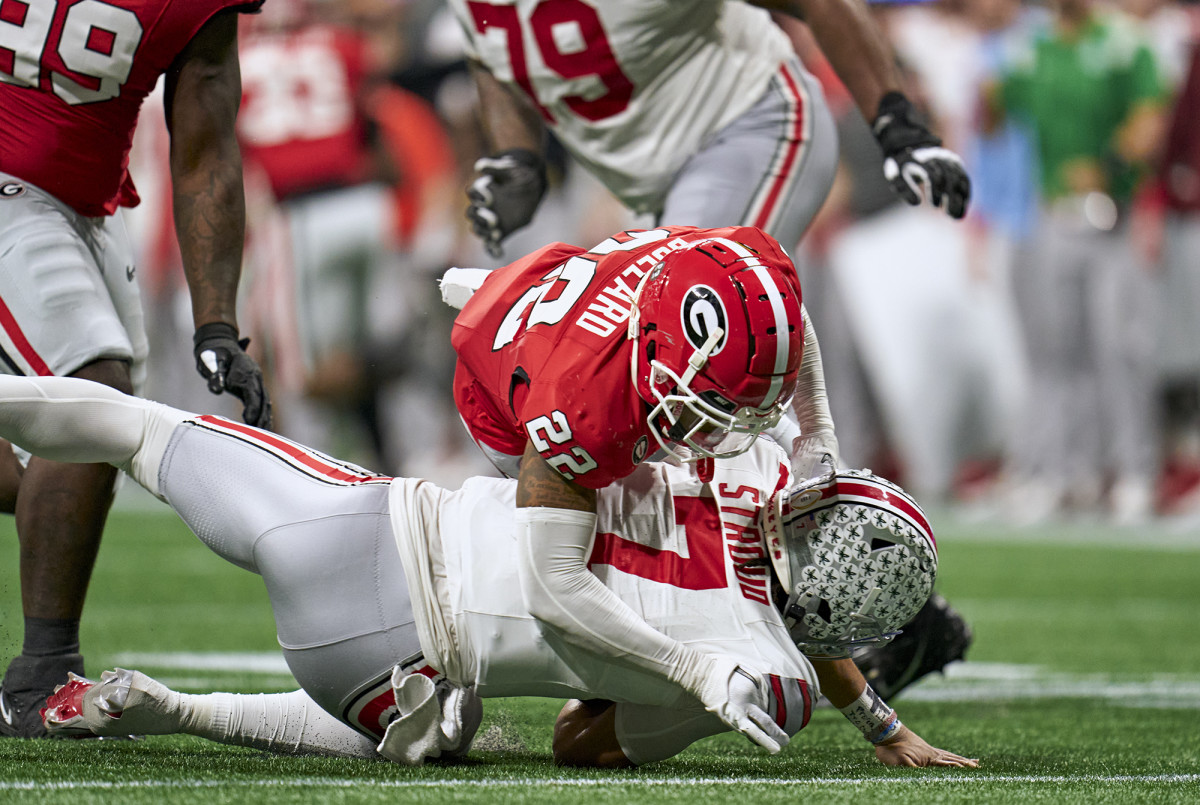
Ohio State
The single biggest counterpoint to the premise that Georgia is miles ahead of everyone else is this: The Buckeyes came within a missed 50-yard field goal of beating the Bulldogs on the final play of last season’s Playoff, having led by 14 points in the fourth quarter. (The Dawgs needed a long series of plays to go their way to mount a comeback.)
Ohio State recruits well enough to hang with Georgia. And after having their mettle questioned following a blowout loss to Michigan, the Buckeyes showed they have some substance in pushing Georgia to the brink. But this remains a program that has to get better defensively, and fifth-year coach Ryan Day has yet to prove he can beat an SEC power.
LSU
Brian Kelly left Notre Dame for a reason: to win a national championship. LSU, having won three titles this century under three different coaches, offers him the chance. Talent is available, and the school is willing to do whatever it takes to win it all.
The Tigers were better than expected in their first year under Kelly, but work remains. While Michigan and maybe Ohio State appear better equipped to challenge the Bulldogs this season, LSU could be a bigger threat down the road. “Based upon how we’re recruiting and how we’ll continue to recruit, we’ll have a football roster that can compete against Georgia,” Kelly says. “Then we have to get it done on the field. Is that right now? No, it’s not.”
Texas
They may make you feel like a fool for believing it, but it looks like the Longhorns are really on the verge of being back. After years of false promise, it’s all lined up for 2023: experience, talent, depth, urgency. “This team is different,” says third- year coach Steve Sarkisian, another former Saban assistant. “They have a different look in their eye.”
Recruiting with an eye on SEC membership starting next year, the Horns might finally be tough enough in the trenches to compete with the biggest of big boys. “You win football games up front, and you’ve got to recruit big humans to make that happen,” Sarkisian says. “And that’s something that we’ve committed ourselves to doing.”
The bigger issue might be Sark himself. In nine previous seasons as a head coach, he’s been good, but he’s not yet shown greatness. Does he have it in him?
Alabama
This may well sound like heresy, but: The bet here is that we have already passed the inevitable beginning of the inevitable end of Saban’s sustained period as the best coach in the game. His championship window is closing, and his 2023 team is not one of his best on paper.
But if the 71-year-old has one title run left in him, it might come a year or two from now. The 2023 Alabama signing class has been heralded as potentially the best in recruiting annals. When armed with superior talent, Saban is tough to bet against. If he ends Smart’s run, after the pupil had followed the master’s blueprint for taking over college football, that would have a certain poetry to it.
